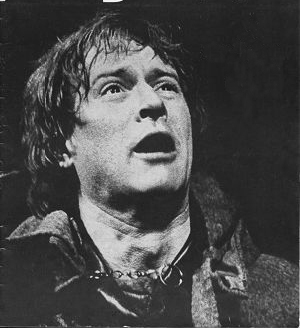A good case for kings
|
Historically kings may be outmoded, but
dramatically we miss them.
Drama being an instrument for the apprehension
of man, a king interests us partly because exciting things are likely to happen
to him, partly because both what he does and what he suffers may affect
thousands of others. Most of all, perhaps, the king interests us because he
knows all this; there is hardly a moment when he can forget it.
This, of course, is the burden and the magic of
Shakespeare's histories, plays which range the country, returning always to a
royal base. Its definitive statement is the ceremony speech in Henry V, which
is now being given searching, imaginative expression by Alan Howard at
Stratford. As it should be: this speech follows a debate on the monarch's
responsibility to his subjects; it details obsessively the symbols of royalty,
describes the concept as a 'proud dream,' but offers no hope that it may be
escapable. Henry by now is wedded to his office; nothing else of him is
left. |

|
This speech is the summation not only of the play and
of Terry Hands's production, but of the whole season. It may seem a little
early to pronounce this verdict since we have yet to see any of the other
plays. But this year Stratford is running backwards: Henry V is to be followed
by the two parts of Henry IV (though Part I will actually, if inconsistently,
precede Part II). The education of a prince is beyond doubt the subject of
Henry IV, and it can be demonstrated - though not conclusively proved - that it
is that of Henry V as well.
As yet, however, we have only the last play to go on,
and its first night set up some curious, muted reverberations. We could not
(and were not, I think, intended to) respond to the play wholly for itself, but
neither could we bring to it fully-formed memories of earlier episodes. In the
comedy scenes I warmed to Tim Wylton's Bardolph, with his pickled-beetroot nose
and bleary intimations of better days, but when Henry gave the order for his
death the production made demands on me I could not meet; I was obviously meant
to remember their former relationship, which won't even be happening for a
month or so. When it does, it will doubtless be enriched by our knowledge of
its end. We shall feel like the White Queen, blessed with perfect recall of the
future.
Meanwhile, Mr Hands's production (which before I
forget, is very good indeed; the best evening I have had at Stratford in ages)
presents us with a fascinating, but not altogether convincing, conflict. On the
one hand there is Emrys James as the Chorus acclaiming Harry, almost from the
outset, as 'the mirror of all Christian kings'; on the other there is Mr Howard
having serious doubts. It takes him until the ceremony speech to become fully
king in his own estimation; that he is king in Heaven's he cannot believe until
after Agincourt, when he murmurs incredulously 'Oh God, thy arm was
here.' The early conspiracy against him ('another fall of man') is greeted with
agonised shock instead of the customary sanctimonious blandness. In other
circumstances, he can put on a good show, a professional imitation of a
hero-warrior. The interpretation suits Mr Howard almost too well; he can be
rather an effortful actor himself, with a steely but over-obsessive grip on the
verse. Like Henry he gets what he wants, which is fine, but you can see him
trying, which isn't. Quibbling aside, he might loosen up a bit for the wooing
of Katherine, by which time Henry is surely the man he wishes to be.
Mr James paints beautiful word-pictures (his
seascapes are particularly seductive); and at the close of the play
unexpectedly annexes the Duchy of Burgundy. I had noted that no Burgundy was
named in the cast, and had rather expected his lines on the devastation of war
to be given to Oliver Ford-Davies, a courteously forceful French Herald. Being
emblematic they would come better from a herald than a chorus. While in France,
I must pay additional homage to Geoffrey Hutchings, whose petulant Dauphin, an
unsuccessful candidate for heroism, counterbalances Henry; to Ludmilla Mikael
(beshrew her eyes) as the princess, and to Yvonne Coulette, her amused, amusing
attendant.
On the home team Trevor Peacock's unexpectedly
engaging Fluellen is partnered by a sturdily original Gower from Derek Smith.
The same two actors in the first scene play at being bishops, Mr Smith more
successfully than Mr Peacock. At this point, everybody is dressed in jeans and
the stage is overhung by a large grey-green contraption with ungainly folds,
looking like a giant upended artichoke. Once war has been declared it descends
and reveals itself to be a dazzling stage-cloth in the pattern of a coat of
arms. The general aspect becomes as pleasing as it is intelligent. It is worth
going to Stratford merely to see the golden armour of the French catch the sun.
The English, very properly, look to have cost much less. Farrah is the
designer.
Robert Cushman
Observer, 13.4.75
